
|
|
|||||
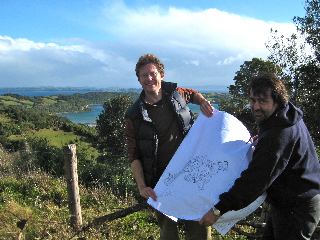 Household water in Maputo, Mozambique... Salmon farming in Chiloé, Chile... Resource management in Ha'ena, Kaua'i... Each tells the story of an E-IPER student conducting research in close collaboration with local people, universities, and organizations. By immersing themselves deeply into the community and taking advantage of local knowledge and connections, E-IPER students can identify and pursue the most salient research questions and apply the most culturally-appropriate methods. And they contribute to the community directly by training local people to participate actively in the research and by assisting local leaders and organizations to apply the research findings to address community concerns.
Household water in Maputo, Mozambique... Salmon farming in Chiloé, Chile... Resource management in Ha'ena, Kaua'i... Each tells the story of an E-IPER student conducting research in close collaboration with local people, universities, and organizations. By immersing themselves deeply into the community and taking advantage of local knowledge and connections, E-IPER students can identify and pursue the most salient research questions and apply the most culturally-appropriate methods. And they contribute to the community directly by training local people to participate actively in the research and by assisting local leaders and organizations to apply the research findings to address community concerns.In Maputo, Valentina Zuin (PhD 2nd year), advised by Jenna Davis and Len Ortolano in Civil and Environmental Engineering, is investigating the impact of a new policy allowing residents with access to a piped water supply to sell water to their neighbors who lack a piped connection. This policy, which will be tested on an experimental level in three neighborhoods of Maputo (where about 100,000 people live), is expected to reduce the price and time people spend and the distance they walk to fetch water and to increase the quantity of water available to consumers.
Across the southern oceans, Andy Gerhart (PhD, 4th year) is on the island of Chiloé, southern Chile, conducting interviews of salmon filleters, algae harvesters, pig farmers, truck drivers, and grandmothers in an effort to document how daily life changed as a result of the rapid growth of the salmon farming industry from the perspective of local people. This effort follows a large survey his Woods Institute for the Environment funded team, led by Zephyr Frank (History) with Roz Naylor (Environmental Earth System Science), Richard White (History), and Meg Caldwell (Law, Center for Ocean Solutions), conducted last year.
Further north in the Pacific Ocean, Mehana Blaich Vaughan, also a 4th year doctoral student, is deeply immersed in the community where she grew up on the Hawaiian island of Kaua'i, studying the management of local watersheds and an in-shore fishery. Similar to Valentina, Mehana is investigating a new resource management law, studying the implementation process and the emerging local ecological and social impacts.
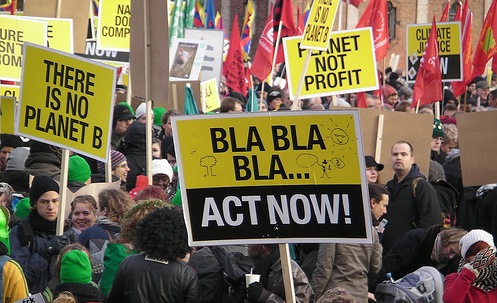 Michael Ovadia, a 1st year PhD student who is also pursuing an MBA at the Graduate School of Business, attended the United Nations Framework Convention on Climate Change (UNFCCC) in Copenhagen this December as a member of Stanford's 40 person delegation. Excerpts from Michael's Copenhagen journal illustrate the chaos of the negotiations and the profound influence the experience had on him personally.
Michael Ovadia, a 1st year PhD student who is also pursuing an MBA at the Graduate School of Business, attended the United Nations Framework Convention on Climate Change (UNFCCC) in Copenhagen this December as a member of Stanford's 40 person delegation. Excerpts from Michael's Copenhagen journal illustrate the chaos of the negotiations and the profound influence the experience had on him personally.Copenhagen, December 12, 2010: The day was spent at the Bright Green conference, kicked off by a panel that included the princes of Denmark and Norway and the princess of Sweden, who had traveled around the Arctic documenting the early impacts of climate change.
December 13: Today was spent away from the (in)famous Bella Center at an intimate event put on by the International Gas Union.
December 14: Back at the Bella Center, Secretary Steven Chu of US Dept. of Energy co-announced the Climate REDI Program with Ministers from Italy, India, and Australia. The US contribution is $85M over 5 years.
December 15: Another Bella Center day. With no warning, all of the African States walked out of the discussions on Dec. 14th. I was told that this was Africa signaling that it (1) wants to be more visible and (2) won't sign an agreement without substantial compensation.
Final Reflections:
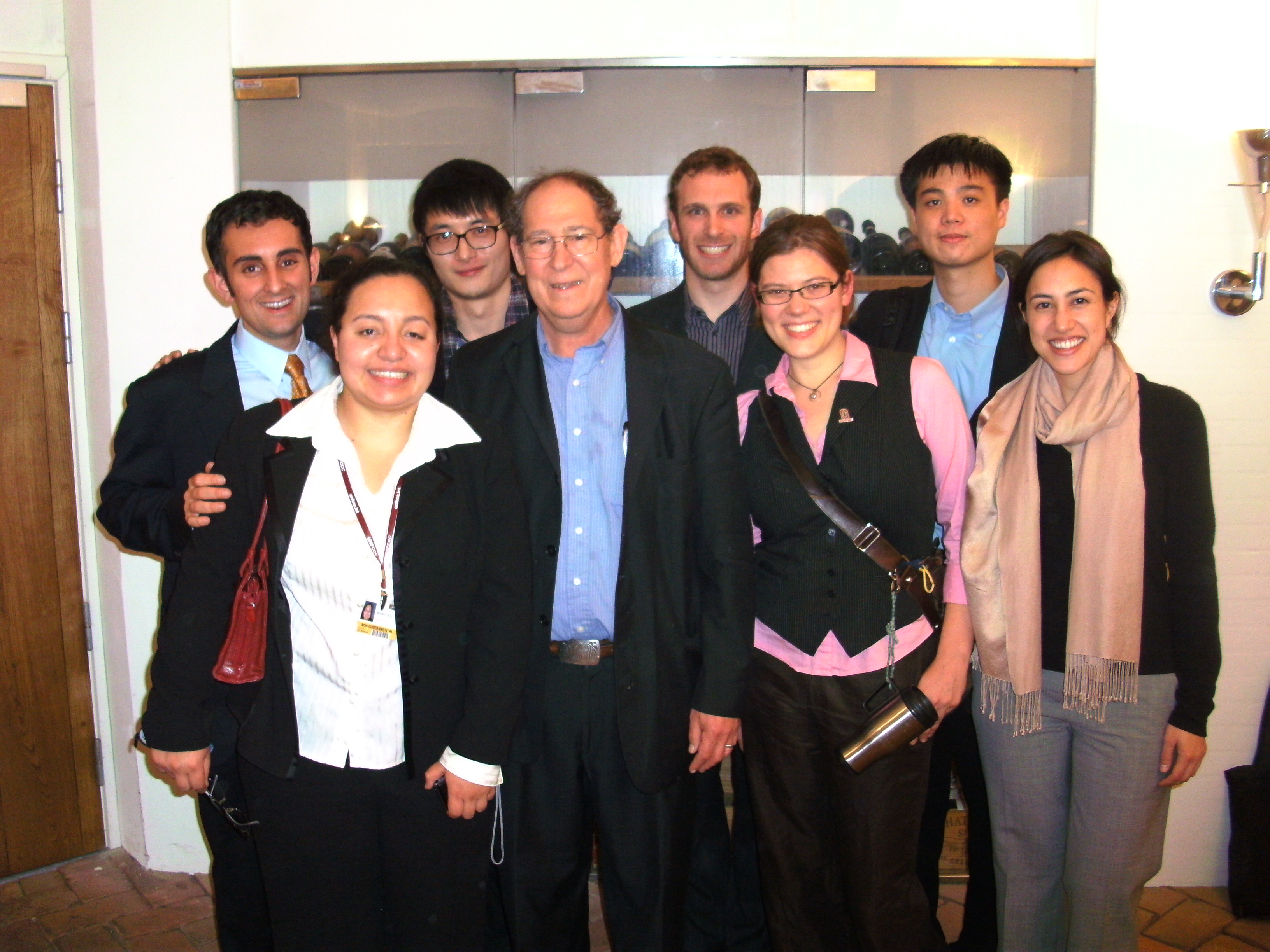 Overall, COP 15 was a truly eye-opening event for me on many levels: learning about the issues, ranging from energy to the UNFCCC process; understanding the change-making process around climate and other environmental issues; meeting the ecosystem of players and world leaders involved in global negotiations; getting to know a group of Stanford peers on an intimate level; recognizing my own biases; and leaving inspired by the beautiful, smart, and sustainable cities of Denmark and Sweden.
Overall, COP 15 was a truly eye-opening event for me on many levels: learning about the issues, ranging from energy to the UNFCCC process; understanding the change-making process around climate and other environmental issues; meeting the ecosystem of players and world leaders involved in global negotiations; getting to know a group of Stanford peers on an intimate level; recognizing my own biases; and leaving inspired by the beautiful, smart, and sustainable cities of Denmark and Sweden.Learn more about Stanford students' and professors' COP 15 participation, and read the Center for Ocean Solutions blog.
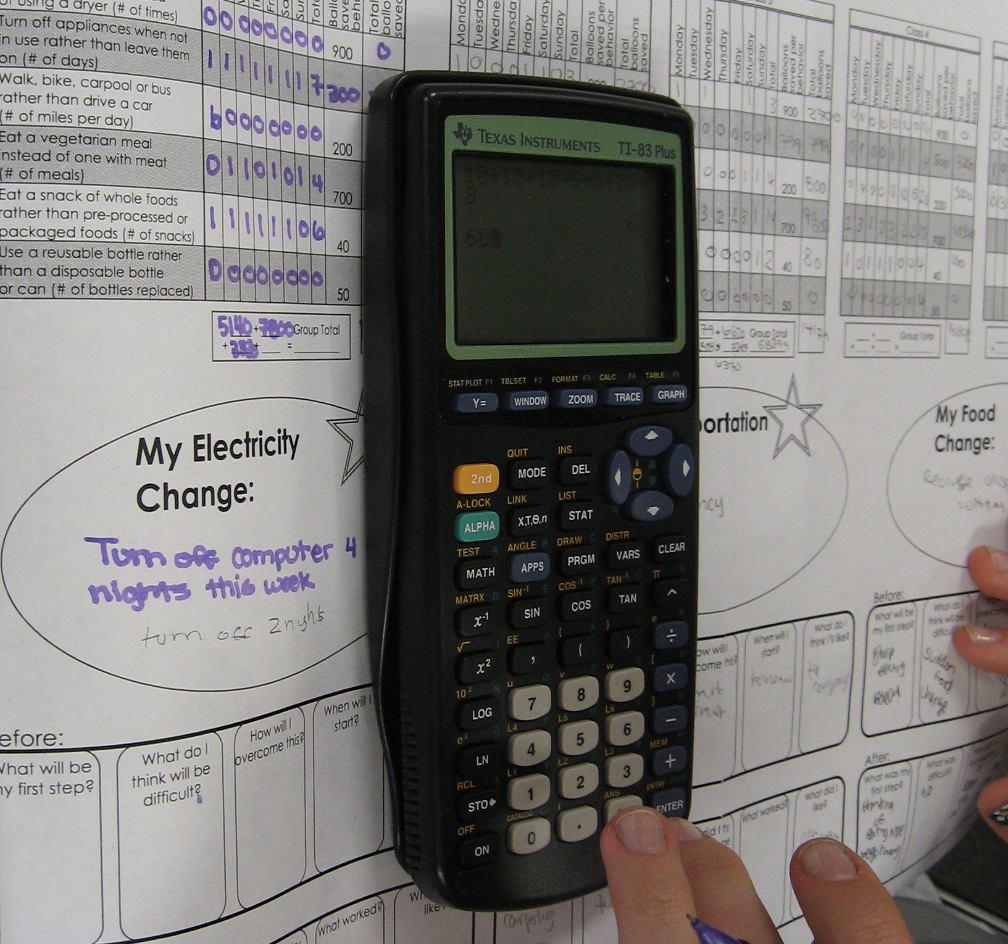 Many E-IPER students focus their work on understanding and influencing individual behaviors that may, when aggregated, contribute to global sustainability. Line dry your clothes? Eat less sushi? Bike instead of drive? How much difference do your actions make? What motivates people to change their behaviors for the greater good?
Many E-IPER students focus their work on understanding and influencing individual behaviors that may, when aggregated, contribute to global sustainability. Line dry your clothes? Eat less sushi? Bike instead of drive? How much difference do your actions make? What motivates people to change their behaviors for the greater good?Marilyn Cornelius (3rd year PhD) is working with Tom Robinson (Medicine) and Carrie Armel (Precourt Energy Efficiency Center, which funds the project) to design and implement a climate change related behavior-change curriculum as a randomized controlled experiment at a California public high school. Preliminary results show that the curriculum is effective in changing behavior of those students who received the curriculum compared to control groups. That is, those who receive the curriculum reduce their energy use by changing several simple, daily behaviors and receive positive feedback by aggregating their "carbon reduction" with other team members.
Like energy consumption, food consumption has an enormous impact on climate change, as well as on the sustainability of marine, land, and freshwater resources. Dane Klinger (PhD, 2nd year) and Kimiko Narita. (Joint JD-MS, 2nd year) co-authored an article in Foreign Policy, titled "Peak Tuna", in which they discuss the threat that wild bluefin tuna populations face due to the increasing demand for toro sushi, a popular delicacy in Japan and around the world. They propose that an international trade ban, listing bluefin as "threatened with extinction" under the Convention on International Trade in Endangered Species of Wild Fauna and Flora (CITES), may be an effective way to restore the bluefin population - perhaps more effective than trying to educate sushi restaurant patrons to change their orders.
What is the additive effect of individual behavior changes such as those studied by Marilyn's team? Danny Cullenward (PhD, 2nd year) is expanding the US government energy models to predict the energy efficiency implications of changes in individual energy consumption behavior. With co-author Jordan Wilkerson (a PhD student in CEE), Danny presented this work to the US Dept. of Energy's Energy Information Administration (EIA), which currently assumes static consumer behavior for its official energy forecasting and policy analysis. Danny is also looking at how insights from behavioral sciences could be applied to improving federal energy policy analysis, and presented a paper on this work at the Behavior, Energy and Climate Change Conference in November.
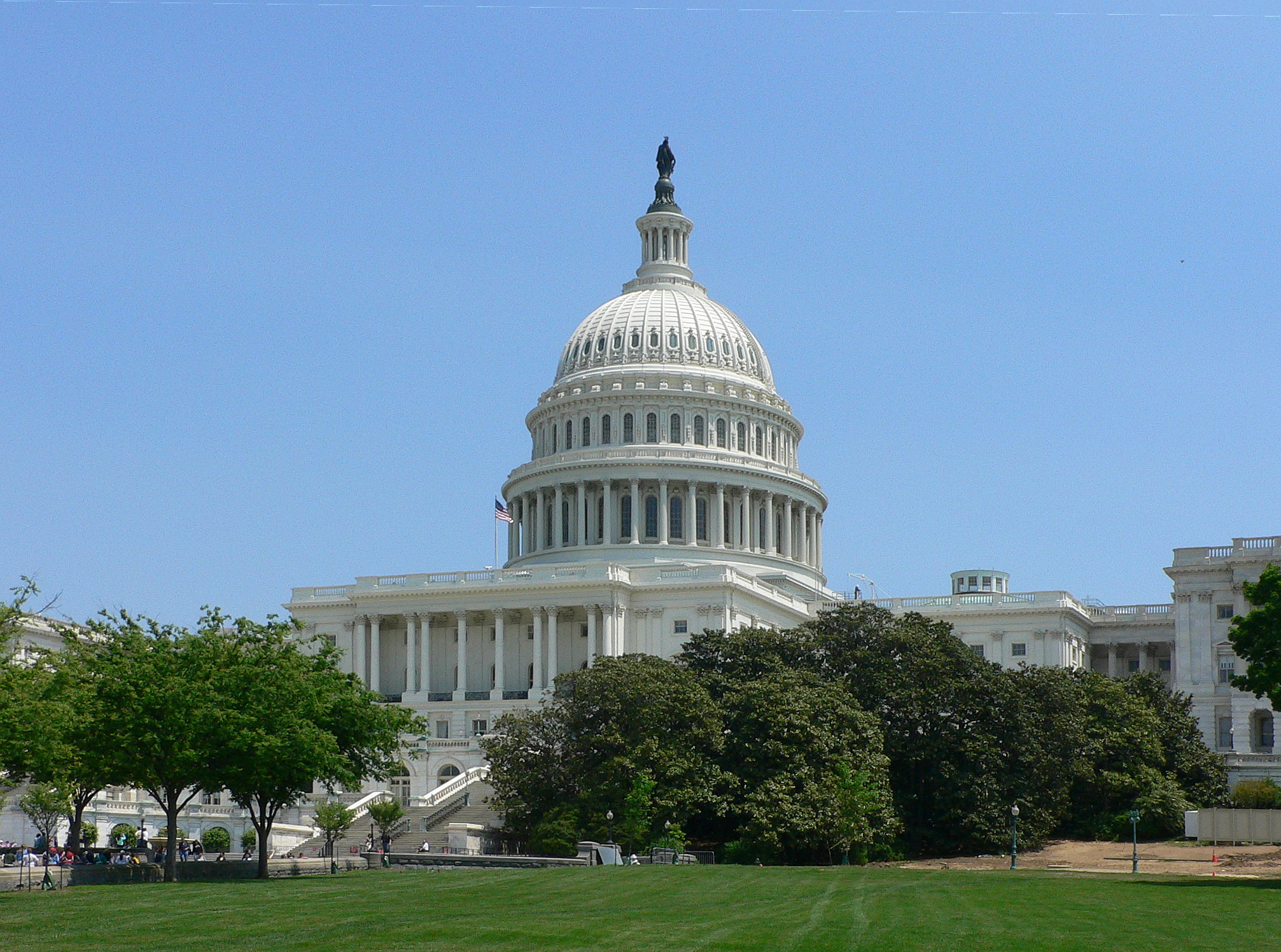 Two E-IPER graduates discuss life beyond academia as they pursue careers working on climate policy in Washington DC. Jason Funk (PhD '09), a conservation analyst with the Environmental Defense Fund, works on a number of projects, including domestic and international accounting rules for forest carbon and wetland restoration in Louisiana to mitigate damage from sea level rise and storm surges. Holmes Hummel (PhD '06), senior policy advisor in the Office of Policy and International Affairs at the US Dept of Energy, works on a number of US energy policy issues, including Administration authorities to drive clean energy technologies and the US negotiating position on technology cooperation in the recent COP15 climate negotiations in Copenhagen.
Two E-IPER graduates discuss life beyond academia as they pursue careers working on climate policy in Washington DC. Jason Funk (PhD '09), a conservation analyst with the Environmental Defense Fund, works on a number of projects, including domestic and international accounting rules for forest carbon and wetland restoration in Louisiana to mitigate damage from sea level rise and storm surges. Holmes Hummel (PhD '06), senior policy advisor in the Office of Policy and International Affairs at the US Dept of Energy, works on a number of US energy policy issues, including Administration authorities to drive clean energy technologies and the US negotiating position on technology cooperation in the recent COP15 climate negotiations in Copenhagen.After a little friendly sparring over whether or not there's any life left for a climate bill pending in the Senate, Jason and Holmes reflect on their training in E-IPER and offer words of wisdom to current students.
On becoming an interdisciplinary researcher...
Holmes: The only possible path to rigorous graduate study in the field of my interest was through an interdisciplinary course. The integration of public policy, energy technology, economics, and the analytic toolkit of modeling is hard to find in any disciplinary program. Even then, if you find a disciplinary program that can support that level of integration, the product of your work is judged primarily through one lens. The strength of my E-IPER education has supported the level of performance I've been able to contribute to professional positions since graduation, including the Office of Congressman Jay Inslee and the Energy Resources Group at UC-Berkeley.
Jason: At the moment I was writing the last few sentences of my dissertation, I felt like all of the boundaries had totally dissolved - it was a body of work that made sense to me, and then it became my job to communicate it to my committee. That's what E-IPER is all about: reaching that point where it no longer really makes sense to talk about one discipline or another and where your work fits in. Instead, at the end I thought, "I've answered a set of questions here; I understand how all these disciplines fit in, but it's (a body of work) that has gone beyond the disciplines."
On being a Swiss Army knife...
Jason: My supervisors tell me all the time, "You're worth three people. And we're paying you one salary." But it took them a while to figure out what to do with me. They asked me, "Are you a geographer guy? Are you a social science guy? Are you an economist? Are you a conservation biologist?" So they started plugging me into different meetings. I would show up and occasionally make comments, and then people started to realize 'Whoa, this guy really knows about a lot of different areas.' And then they started realizing how to plug me into programs. By the end of the year (of my Lokey Fellowship) they said, "We can't afford to let you go." It was very validating: it was a bad time (financially) for NGOs, and EDF was having the same challenges as others. But EDF pulled a lot of strings to make sure I could stay.
Referring to the layoffs at many non-profits, Jason concluded, "I think my supervisors had to ask themselves 'When you need to throw out some of the tools in your toolkit, you want to keep the Swiss Army knife, right?'"
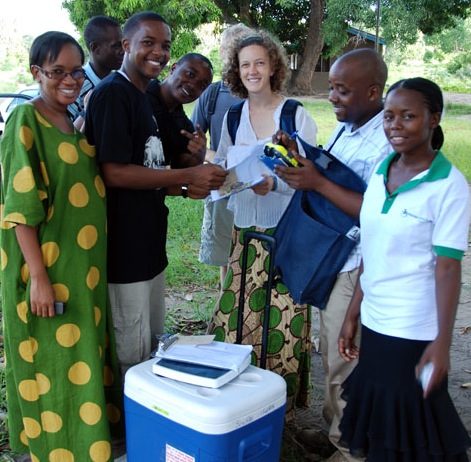 Through conference presentations, peer-reviewed publications, collaborative workshops, and videos, E-IPER students make an impact by sharing their research and projects with diverse audiences ranging from academic colleagues to policy makers to advocacy organizations to individual citizens.
Through conference presentations, peer-reviewed publications, collaborative workshops, and videos, E-IPER students make an impact by sharing their research and projects with diverse audiences ranging from academic colleagues to policy makers to advocacy organizations to individual citizens.Amy Pickering's (PhD, 3rd year) paper, "Efficacy of waterless hand hygiene compared with handwashing with soap: A field study in Dar es Salaam, Tanzania," was accepted for publication by the American Journal of Tropical Medicine and Hygiene, with co-authors Alexandria Boehm (CEE), Mathew Mwanjali, and Jennifer Davis (CEE). Amy also presented this work at the American Public Health Association conference in Philadelphia in November and presented a poster titled, "Causal mechanisms of hand contamination with fecal indicator bacteria among mothers in Dar es Salaam, Tanzania" with co-authors Timothy Julian, Alexandria Boehm, and Jennifer Davis at the American Society for Tropical Medicine and Hygiene conference in Washington, DC, also in November. Amy's work is also part of a winter field course, "Advanced field methods in water, health, and development" taught by Davis and Boehm, with project sites in Bagamoyo, Tanzania and Maputo, Mozambique, as well as Dar es Salaam.
Caroline Scruggs (PhD, 4th year) published a report "Protecting Consumers and the Environment: A Comparison of Approaches to Developing Restricted Substance Lists by Makers of 'Stuff We All Use'", with the International Chemical Secretariat, ChemSec. Caroline will be speaking at the American Chemicals Society's national meeting in March on, "Removing Hazardous Substances from Products and Supply Chains: Approaches of Several Proactive Multinational Companies."
Adam Millard-Ball (PhD, 4th year) and Leonard Ortolano (CEE) published a paper, "Constructing Carbon Offsets: the Obstacles to Quantifying Emission Reductions" in Energy Policy. Adam and Lee Schipper (Precourt, MS&E) presented a paper at the Transportation Research Board Annual Meeting in Washington, DC in January: "Are We Reaching a Plateau or Peak Travel? Trends in Passenger Transport in Six Industrialized Countries." Adam also presented a second paper: "Transport in the Global Carbon Market: Baseline Challenges With Sectoral No-Lose Targets." Adam received the Transportation Research Board's Burggraf Award for excellence in transportation research by researchers under 35 years of age, for his 2009 paper, "Cap-and-Trade: Five Implications for Transportation Planners", published in Transportation Research Record.
Andrew Perlstein (PhD, 5th year) gave a presentation -in Mandarin, no less- titled "Urban Sustainability in China: A Remote Sensing Case Study of Nanchang" at the annual conference for the Chinese journal Urban Planning International in Chongqing, China.
Hilary Schaffer Boudet (PhD, 6th year) had a paper accepted to the journal Sociological Forum: "Site fights: Explaining opposition to pipeline projects in the developing world", with co-authors Doug McAdam, Dick Scott (both in Sociology); Jenna Davis, Ray Levitt, and Ryan Orr (all of Civil and Environmental Engineering and Stanford's Collaboratory for Research on Global Projects).
Kate Brauman (PhD, 6th year) presented a video case study of her work on water resources and land management in Hawai'i at the Ecological Society of America's first Millennium Conference. Kate continues her work with RiskBase, a European group using risk-based management strategies to help EU river basin managers meet the goals of the Water Framework Directive, attending two conferences and working on a chapter for their upcoming book.
To learn more about E-IPER, visit e-iper.stanford.edu
To subscribe or unsubscribe, email your request to Helen Doyle: hdoyle@stanford.edu